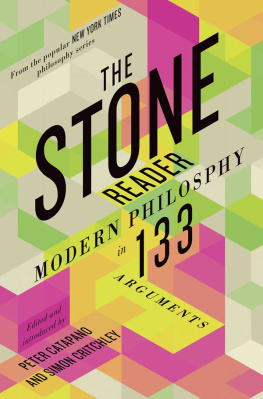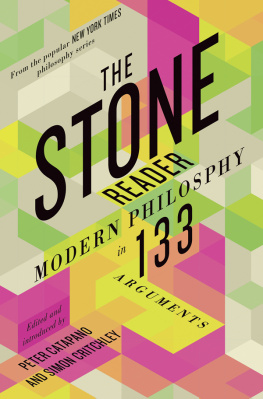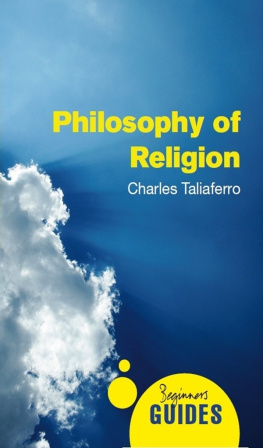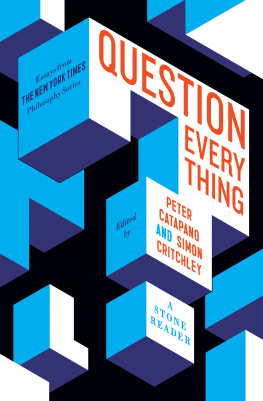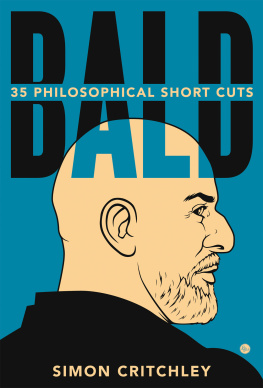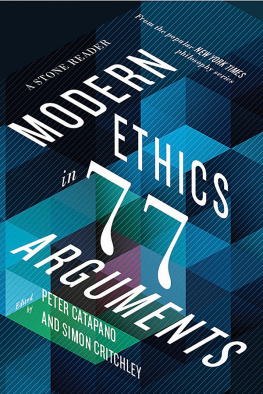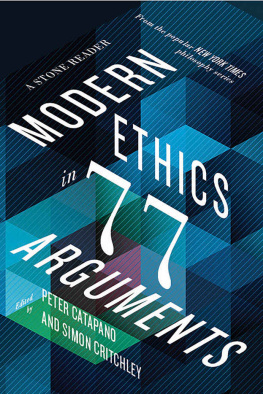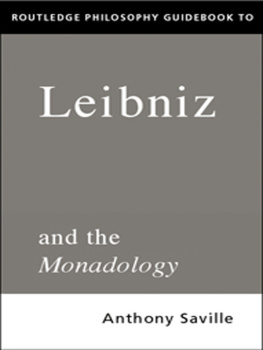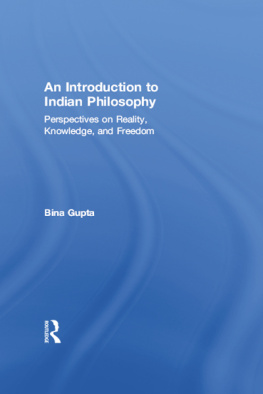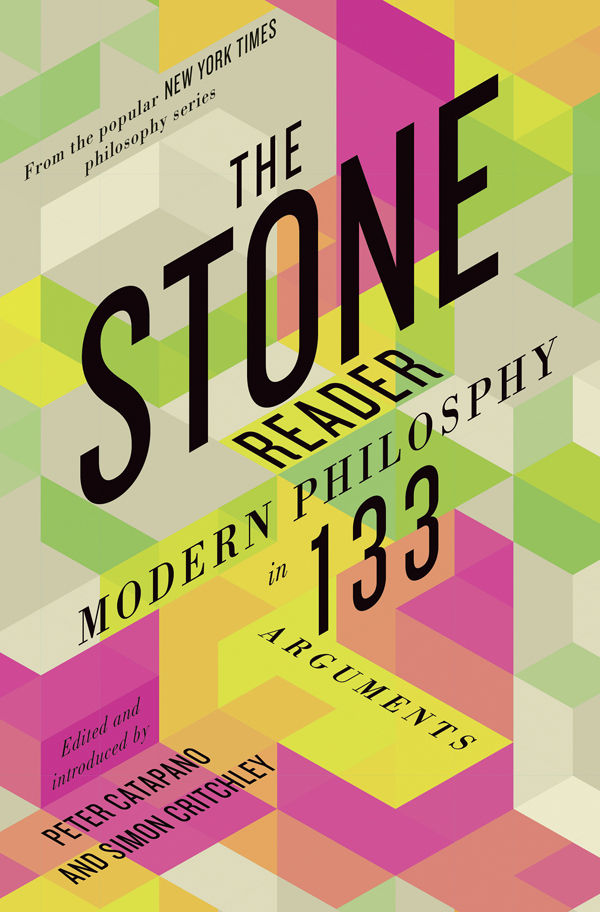
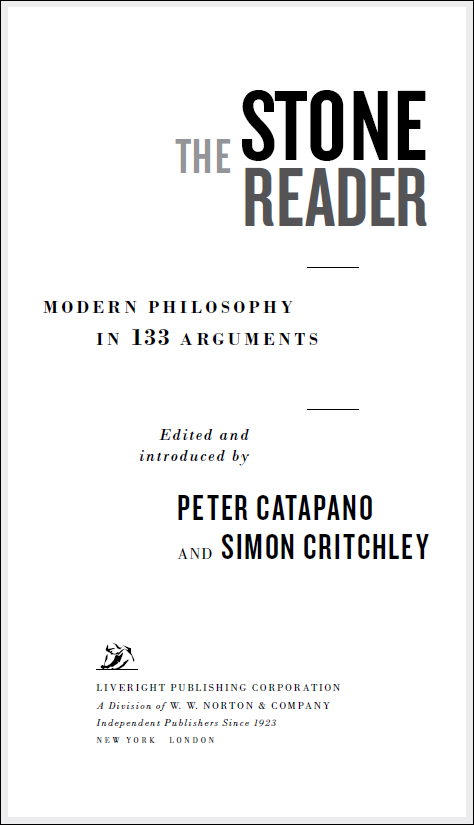
CONTENTS
Of Cannibals, Kings and Culture:
The Problem of Ethnocentricity Adam Etinson
Cambridge, Cabs and Copenhagen:
My Route to Existential Risk Huw Price
Mary and the Zombies:
Can Science Explain Consciousness? Gary Gutting
I.
What is a philosopher? And more important, who cares?
These two questions, and our attempt to answer them, are central to explaining this book, a collection of more than 130 essays and arguments from The New York Times philosophy series, The Stone.
The questions are not arbitrary; they arose as we began this project in 2010, guided us as we developed it over the next five years, and like all the best questions, presented themselves again and again, and forced us to rethink our answers as we went along.
As might be expected, the answer to the firstWhat is a philosopher?is somewhat elusive. At least one of the contributors to this book has taken a stab at itSimon Critchley, my coeditor and coconspirator in this project, devotes the opening essay to it. Many others over the last few centuries have, too, and their conclusions vary: Truth seeker. Rationalist. Logician. Metaphysician. Troublemaker. Tenured professor. Scholar. Visionary. Madperson. Gadfly. Seer.
Underlying at least some of these definitions is a common perceptionthat a philosopher is a marginal, perhaps useless, creature, typically unemployable, poorly wired for worldly pursuits and ill suited for normal life. In other words, a philosopher is a person whose habitual introspection renders him or her of little practical use to those in the real world. Remarkably, that perception hasnt changed much over time. When was the last time you heard a proud parent mention my son, the philosopher, or my daughter, the metaphysician? Philosopheras opposed to, say, firefighter, web developer or regional risk-assessment managerisnt quite a job , is it? In polite or expensively educated company, wherever that might be found, identifying oneself as a philosopher might only raise a few eyebrows; in certain other precincts, that is to say practically everywhere, the admission would more likely be met with laughter, puzzlement, scorn or worse.
Implicit here is the view that philosophy itself is somehow deficient, an impractical, even indulgent intellectual pursuit. This strain of anti-intellectualism is thought to be especially virulent in the United States, with its can-do, colonialist DNA and a bloodthirsty manifest destiny at its historical corea view Richard Hofstadter laid out famously in his book Anti-Intellectualism in American Life (1963). We may even go as far as to say that in America, where the evangelical overlords of material productivity still hover, navel-gazing of the sort philosophers engage in might be considered a punishable offense, or worst yet, a sin. It might follow, then, that the United States is a nation in which any sort of intense thoughtfulness has no real place.
All this leads us to the second questionWho cares?because if the answer is no one, why waste any time answering the first or even thinking about any of this?
Lets be guileless for a moment, put aside the questions implied dismissal, and take it literally. The answer in that case is actually simple and surprising: A lot of people care. Despite a robust global appetite for cat videos, pop music and porn, and the alleged collapse of the humanities in American life, millions care deeply about, study, consume and practice philosophy. It is not confined to its traditional place in the university system. In fact, more people than ever have access to philosophical works and schools of thought, and they use them. As you no doubt know, the works of any philosopher under the sunfrom Plato to Avicenna to Heidegger to the seventeen-year-old Spinoza devotee with a blogare available electronically in most of the developed world. That was not the case a few decades ago.
Given all this, we find the often heard argument that philosophy, along with the rest of the humanities, is rapidly becoming obsolete to be a tired one. With all due respect, we reject that claim. We maintain that the reports of the death of American intellectual life (and such life elsewhere) have been greatly exaggerated, and that philosophy both inside and out of the academy is more vital than ever. And we offer this collection, as well as the popular success of The Stone, as a small bit of evidence.
II.
To those new to this particular philosophical project, here are a few basic facts: The Stone is an ongoing series, launched in 2010 as a part of the online Opinion report of The New York Times . Each week we publish at least one philosophic essay, often dealing with a current social, political or cultural issue. As the short description on the Times website says, the series features the writing of contemporary philosophers and other thinkers on issues both timely and timeless. In other words, we aim to examine the world we find ourselves in by putting forward new ideas without discardingor forgettingthe established wisdom of the past.
As series moderator, Simon often serves as a liaison between the world of professional or academic philosophers and our journalistic work at The Stone. He is part ambassador and part talent scout, inviting philosophers and other original thinkers to write pieces for us, and writing them himself at least a few times a year. Back in the Times Building on Eighth Avenue, I do some of the same; I assign and solicit pieces based on current events or the attractiveness of certain topics and review submissions from writers. Since this is ultimately a product of The New York Times , we conduct the fact-checking, editing and publishing of each essay in-house and take full editorial responsibility for the final product.
The book, as you find it here, is a selection from The Stones first four years of essays, organized into four sections, not chronologically but by way of broad subject areas: Philosophy, Science, Religion and Morals, and Society, each beginning with a short preface written by Simon. Within each of these sections are subsections that offer a sharper focus on the essays. The aim of this structure is to make it easy for readers to navigate the large body of work here. As with any anthology, readers may either work through the material from beginning to end or move back and forth between sections at will. It is neither a text book designed to provide some form of tutelage nor a mere collection of newspaper columns but an anthology of contemporary essays and arguments that we hope will engage readers and reward many readings, and make clear the continued relevance of philosophy.
The seed for The Stone was planted in a much larger initiative at the Times . In late 2005 I was hired as an editor in Opinion by the editorial page editor at the time, Gail Collins, to help with the effort to develop material that would take full advantage of the possibilities in the digital space. What could we do here that we could not do on the printed page? While I cant speak for the intent or vision of my superiors or the great institution for which I work, I can say that as an editor with deep interests in not just world events, as a job like mine normally requires, but in artistic, intellectual and cultural life as well, I was excited by the possibilities. There was the sense, rare at a big newspaperor an organization of any kind, reallyof being given space to create new forms, to pursue themes, ideas and writers both within and outside the typical realm of opinion journalism, and venture into areas that were socially or culturally relevant, whether they responded directly to the news, danced around it or just shed a broader light on it. New ideas and approaches were encouraged, green-lighted and supported. The field was open.
Next page
